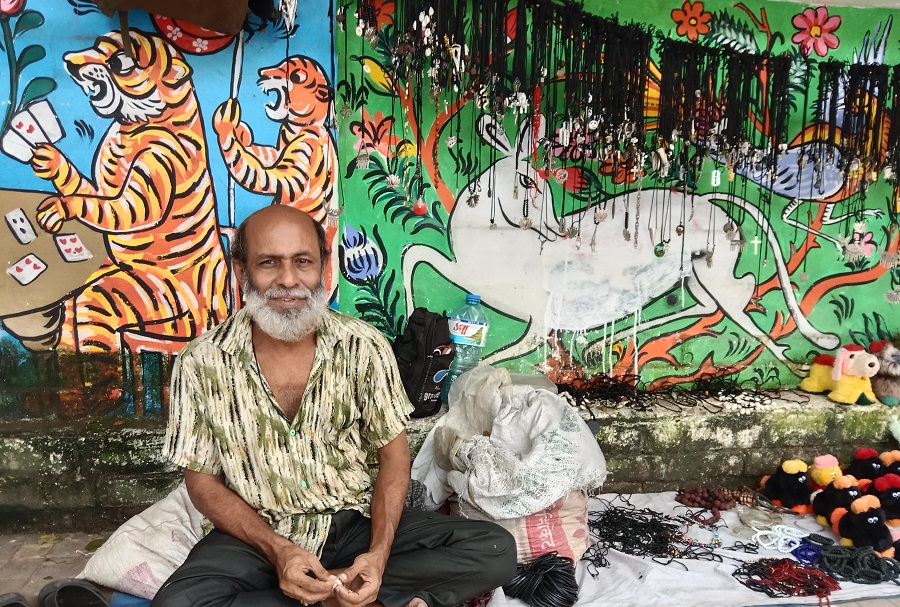Sentu bhai of Charukola: The man who feeds his feathered and furry friends

Published :
Updated :

At the gate of Dhaka University's Fine Arts, the Madhabilata tree stretches its branches over the adjoining boundary wall. From dawn to dusk, this spot is alive with chirping birds and scurrying squirrels. By noon, the chatter of the birds grows louder as though they're anxiously waiting for something.
Bats, too, hanging from the branches, seem to await the arrival of a familiar figure. Around noon, they expect to be fed. Someone appears daily with food not just for them but for other creatures as well.
The mice outside from nearby holes are familiar with the "Ay Ay" call and hurry towards it with equal anticipation. This is Sentu bhai of Charukola.
"Everyone here knows me. I've been running a small, honest business for twelve years—selling bead garlands. And I feed the birds, squirrels, and mice. They're living beings, just like us. Feeding them gives me peace. They all know me now, and if I'm even a little late, you can hear how restless they get!"
Sentu tears up two parathas into small pieces and sprinkles them on the wall. In a moment, the waiting birds and squirrels come from behind the Madhabilata branches as if they had been pondering the last two lines of Rabindranath Tagore's poem "Protiksha"
"I sit here, waiting on this bed of grass; when will your time finally come?"
The time has come. Whether slightly early, on time, or a little late, Kamal Uddin Sentu breaks their daily wait in this same gentle fashion. Yet, his words turn sombre when asked about his life's waiting. "Life is full of unfulfilled dreams. We never get what we hope for. But life goes on, doesn't it?"
When pressed about those dreams, Sentu politely declines to discuss them. "That's a sad story," he says, shifting the conversation back to the birds, squirrels, and mice, as though they bring him more comfort than his history ever could.
When asked how feeding these creatures feels, this gentle lover of animals smiles. "It feels good. I'm happy. If I had more money, I'd spend it on them, feeding them more and more." Then, as if pondering the difference between human and animal happiness, he says, "You know, they have a life, and so do we. But we eat our fill and live our lives, yet we're never satisfied. No matter how much we have, we keep searching for more. But look at them—how little they need to be happy. When they wish, they fly away."
Returning to his childhood, Sentu recalls how he yearned to study. His mother could only afford to keep him in school until sixth or seventh grade.
Poverty haunted his family, making even two meals a day a luxury. "How can you focus on school when you're hungry?" he asks, recounting his early years working in a tannery in Dhaka's Hazaribagh, labouring under heavy loads far beyond his years. He worked for 10 or 12 years, surviving on meagre earnings, never escaping the burden of family responsibilities.
Eventually, he started a small business—a toy shop on Abdul Aziz Khan Lane—but suffered losses.
Undeterred, he moved on to selling gas for lighters, making keychains, and even crafting anklets to sell on the streets of Farmgate and Gulistan. For the past decade or more, he has been selling bead garlands and bracelets at the Fine Arts gate, his life gradually settling into a rhythm of survival.
"I've managed to get by," he says, shrugging off the hardship.
Sentu's roots trace back to the village of Nabinagar in Brahmanbaria. Though he never fulfilled his dream of education, he has ensured that his youngest son, now a third-year student at Dhanmondi's Dr Malika College, pursues his studies.
"I've taught him computer skills. He'll do something good with his life, become a decent human being," Sentu says, hope flickering in his voice.
Standing beside Sentu for just a few minutes reveals his close bond with students and passersby.
Many stop to greet him, ask about his well-being, or chat. One day, a Fine Arts student came to buy a bead garland, reflecting on Sentu's daily acts of kindness. "I've known him for years. He's a genuinely good man. What I admire most is how he feeds the animals. It may seem small, but imagine how beautiful the world would be if we all did these small, kind acts."
For Sentu, these small acts define his life's purpose. "Life is filled with hardship, and many dreams remain unfulfilled," he says, "But one thing I will never stop doing is feeding these creatures."
Under the open sky, his modest little shop may one day disappear. The branches of the Madhabilata will still sway in the breeze, the birds will chirp, and the squirrels will wait, wondering if someone will come with food. The mice will peek out from their holes, listening for that familiar call: "Ay Ay." Perhaps another will answer their call. Maybe no one will.
shakibtahmid05@gmail


 For all latest news, follow The Financial Express Google News channel.
For all latest news, follow The Financial Express Google News channel.